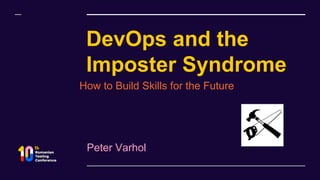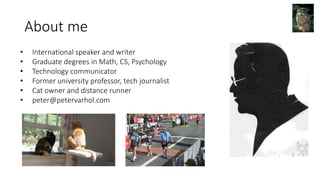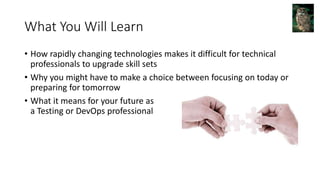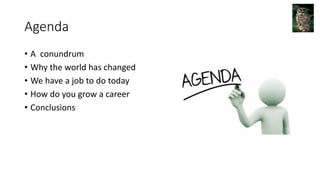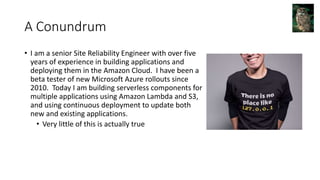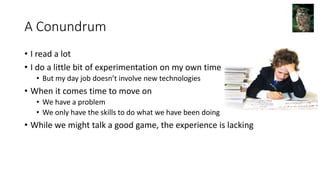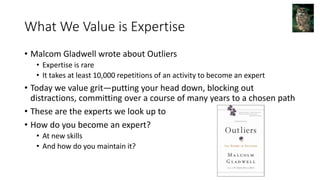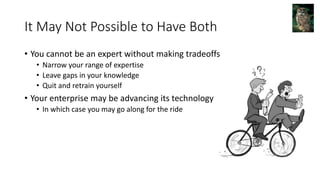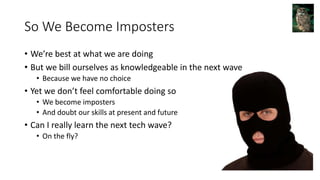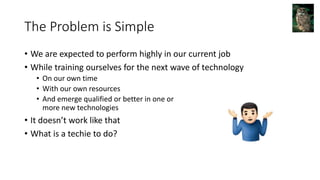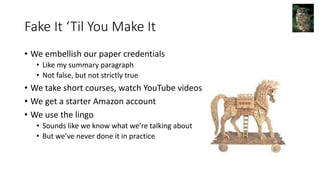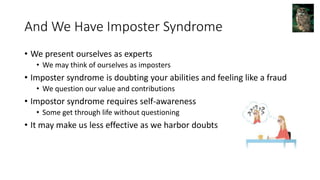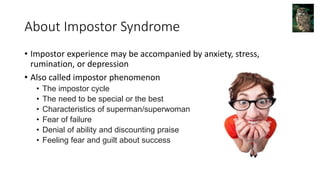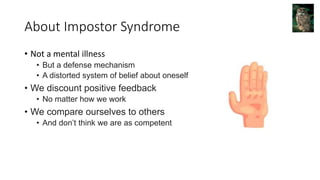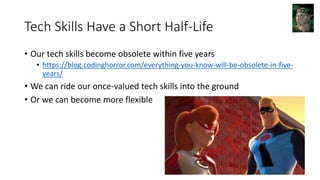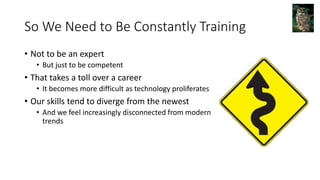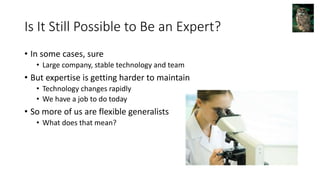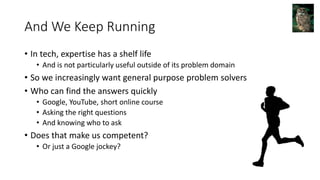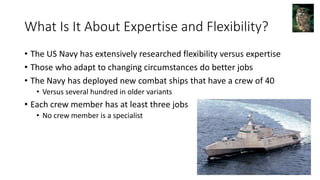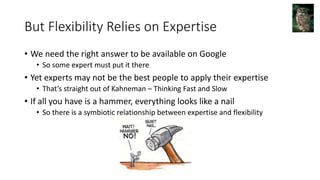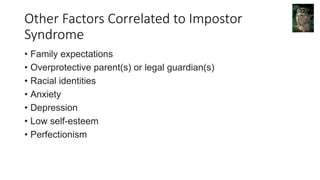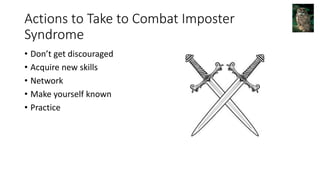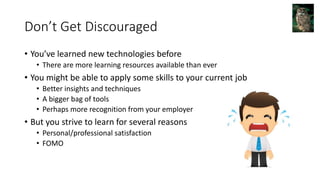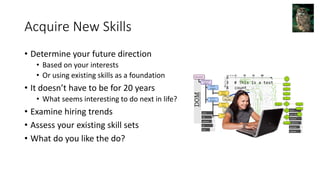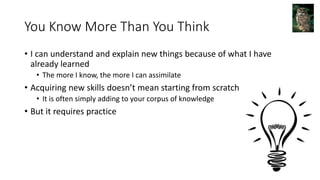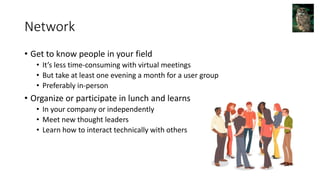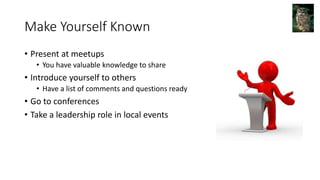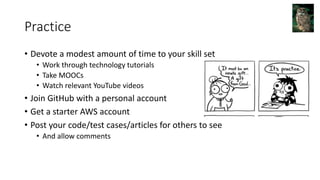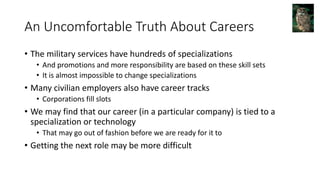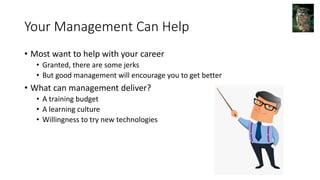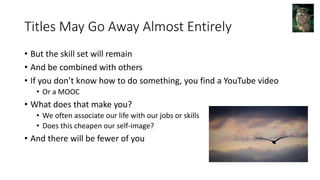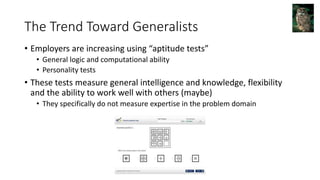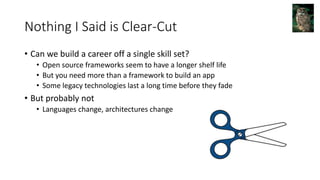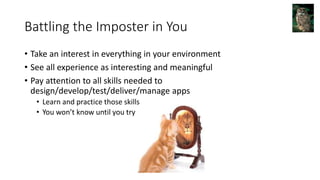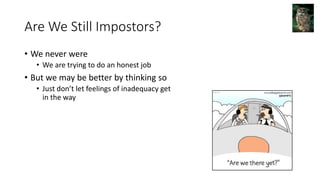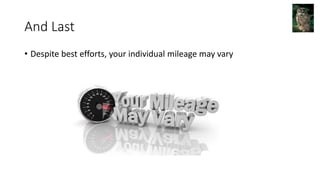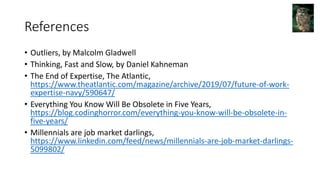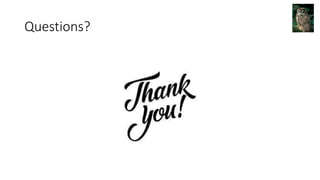DevOps and the Impostor Syndrome
- 1. DevOps and the Imposter Syndrome Peter Varhol How to Build Skills for the Future
- 2. About me • International speaker and writer • Graduate degrees in Math, CS, Psychology • Technology communicator • Former university professor, tech journalist • Cat owner and distance runner • peter@petervarhol.com
- 3. What You Will Learn • How rapidly changing technologies makes it difficult for technical professionals to upgrade skill sets • Why you might have to make a choice between focusing on today or preparing for tomorrow • What it means for your future as a Testing or DevOps professional
- 4. Agenda • A conundrum • Why the world has changed • We have a job to do today • How do you grow a career • Conclusions
- 5. A Conundrum • I am a senior Site Reliability Engineer with over five years of experience in building applications and deploying them in the Amazon Cloud. I have been a beta tester of new Microsoft Azure rollouts since 2010. Today I am building serverless components for multiple applications using Amazon Lambda and S3, and using continuous deployment to update both new and existing applications. • Very little of this is actually true
- 6. A Conundrum • I read a lot • I do a little bit of experimentation on my own time • But my day job doesn’t involve new technologies • When it comes time to move on • We have a problem • We only have the skills to do what we have been doing • While we might talk a good game, the experience is lacking
- 7. What We Value is Expertise • Malcom Gladwell wrote about Outliers • Expertise is rare • It takes at least 10,000 repetitions of an activity to become an expert • Today we value grit—putting your head down, blocking out distractions, committing over a course of many years to a chosen path • These are the experts we look up to • How do you become an expert? • At new skills • And how do you maintain it?
- 8. It May Not Possible to Have Both • You cannot be an expert without making tradeoffs • Narrow your range of expertise • Leave gaps in your knowledge • Quit and retrain yourself • Your enterprise may be advancing its technology • In which case you may go along for the ride
- 9. So We Become Imposters • We’re best at what we are doing • But we bill ourselves as knowledgeable in the next wave • Because we have no choice • Yet we don’t feel comfortable doing so • We become imposters • And doubt our skills at present and future • Can I really learn the next tech wave? • On the fly?
- 10. The Problem is Simple • We are expected to perform highly in our current job • While training ourselves for the next wave of technology • On our own time • With our own resources • And emerge qualified or better in one or more new technologies • It doesn’t work like that • What is a techie to do?
- 11. Fake It ‘Til You Make It • We embellish our paper credentials • Like my summary paragraph • Not false, but not strictly true • We take short courses, watch YouTube videos • We get a starter Amazon account • We use the lingo • Sounds like we know what we’re talking about • But we’ve never done it in practice
- 12. And We Have Imposter Syndrome • We present ourselves as experts • We may think of ourselves as imposters • Imposter syndrome is doubting your abilities and feeling like a fraud • We question our value and contributions • Impostor syndrome requires self-awareness • Some get through life without questioning • It may make us less effective as we harbor doubts
- 13. About Impostor Syndrome • Impostor experience may be accompanied by anxiety, stress, rumination, or depression • Also called impostor phenomenon • The impostor cycle • The need to be special or the best • Characteristics of superman/superwoman • Fear of failure • Denial of ability and discounting praise • Feeling fear and guilt about success
- 14. About Impostor Syndrome • Not a mental illness • But a defense mechanism • A distorted system of belief about oneself • We discount positive feedback • No matter how we work • We compare ourselves to others • And don’t think we are as competent
- 15. Tech Skills Have a Short Half-Life • Our tech skills become obsolete within five years • https://blog.codinghorror.com/everything-you-know-will-be-obsolete-in-five- years/ • We can ride our once-valued tech skills into the ground • Or we can become more flexible
- 16. So We Need to Be Constantly Training • Not to be an expert • But just to be competent • That takes a toll over a career • It becomes more difficult as technology proliferates • Our skills tend to diverge from the newest • And we feel increasingly disconnected from modern trends
- 17. Is It Still Possible to Be an Expert? • In some cases, sure • Large company, stable technology and team • But expertise is getting harder to maintain • Technology changes rapidly • We have a job to do today • So more of us are flexible generalists • What does that mean?
- 18. And We Keep Running • In tech, expertise has a shelf life • And is not particularly useful outside of its problem domain • So we increasingly want general purpose problem solvers • Who can find the answers quickly • Google, YouTube, short online course • Asking the right questions • And knowing who to ask • Does that make us competent? • Or just a Google jockey?
- 19. What Is It About Expertise and Flexibility? • The US Navy has extensively researched flexibility versus expertise • Those who adapt to changing circumstances do better jobs • The Navy has deployed new combat ships that have a crew of 40 • Versus several hundred in older variants • Each crew member has at least three jobs • No crew member is a specialist
- 20. But Flexibility Relies on Expertise • We need the right answer to be available on Google • So some expert must put it there • Yet experts may not be the best people to apply their expertise • That’s straight out of Kahneman – Thinking Fast and Slow • If all you have is a hammer, everything looks like a nail • So there is a symbiotic relationship between expertise and flexibility
- 21. Other Factors Correlated to Impostor Syndrome • Family expectations • Overprotective parent(s) or legal guardian(s) • Racial identities • Anxiety • Depression • Low self-esteem • Perfectionism
- 22. Actions to Take to Combat Imposter Syndrome • Don’t get discouraged • Acquire new skills • Network • Make yourself known • Practice
- 23. Don’t Get Discouraged • You’ve learned new technologies before • There are more learning resources available than ever • You might be able to apply some skills to your current job • Better insights and techniques • A bigger bag of tools • Perhaps more recognition from your employer • But you strive to learn for several reasons • Personal/professional satisfaction • FOMO
- 24. Acquire New Skills • Determine your future direction • Based on your interests • Or using existing skills as a foundation • It doesn’t have to be for 20 years • What seems interesting to do next in life? • Examine hiring trends • Assess your existing skill sets • What do you like the do?
- 25. You Know More Than You Think • I can understand and explain new things because of what I have already learned • The more I know, the more I can assimilate • Acquiring new skills doesn’t mean starting from scratch • It is often simply adding to your corpus of knowledge • But it requires practice
- 26. Network • Get to know people in your field • It’s less time-consuming with virtual meetings • But take at least one evening a month for a user group • Preferably in-person • Organize or participate in lunch and learns • In your company or independently • Meet new thought leaders • Learn how to interact technically with others
- 27. Make Yourself Known • Present at meetups • You have valuable knowledge to share • Introduce yourself to others • Have a list of comments and questions ready • Go to conferences • Take a leadership role in local events
- 28. Practice • Devote a modest amount of time to your skill set • Work through technology tutorials • Take MOOCs • Watch relevant YouTube videos • Join GitHub with a personal account • Get a starter AWS account • Post your code/test cases/articles for others to see • And allow comments
- 29. An Uncomfortable Truth About Careers • The military services have hundreds of specializations • And promotions and more responsibility are based on these skill sets • It is almost impossible to change specializations • Many civilian employers also have career tracks • Corporations fill slots • We may find that our career (in a particular company) is tied to a specialization or technology • That may go out of fashion before we are ready for it to • Getting the next role may be more difficult
- 30. Your Management Can Help • Most want to help with your career • Granted, there are some jerks • But good management will encourage you to get better • What can management deliver? • A training budget • A learning culture • Willingness to try new technologies
- 31. Titles May Go Away Almost Entirely • But the skill set will remain • And be combined with others • If you don’t know how to do something, you find a YouTube video • Or a MOOC • What does that make you? • We often associate our life with our jobs or skills • Does this cheapen our self-image? • And there will be fewer of you
- 32. The Trend Toward Generalists • Employers are increasing using “aptitude tests” • General logic and computational ability • Personality tests • These tests measure general intelligence and knowledge, flexibility and the ability to work well with others (maybe) • They specifically do not measure expertise in the problem domain
- 33. Nothing I Said is Clear-Cut • Can we build a career off a single skill set? • Open source frameworks seem to have a longer shelf life • But you need more than a framework to build an app • Some legacy technologies last a long time before they fade • But probably not • Languages change, architectures change
- 34. Battling the Imposter in You • Take an interest in everything in your environment • See all experience as interesting and meaningful • Pay attention to all skills needed to design/develop/test/deliver/manage apps • Learn and practice those skills • You won’t know until you try
- 35. Are We Still Impostors? • We never were • We are trying to do an honest job • But we may be better by thinking so • Just don’t let feelings of inadequacy get in the way
- 36. And Last • Despite best efforts, your individual mileage may vary
- 37. References • Outliers, by Malcolm Gladwell • Thinking, Fast and Slow, by Daniel Kahneman • The End of Expertise, The Atlantic, https://www.theatlantic.com/magazine/archive/2019/07/future-of-work- expertise-navy/590647/ • Everything You Know Will Be Obsolete in Five Years, https://blog.codinghorror.com/everything-you-know-will-be-obsolete-in- five-years/ • Millennials are job market darlings, https://www.linkedin.com/feed/news/millennials-are-job-market-darlings- 5099802/
- 38. Questions?
Editor's Notes
- #6: Geek humor. 127.0.0.1 is localhost, or the computer you are currently using. https://qz.com/work/1702462/what-happens-to-tech-workers-when-their-skills-become-obsolete/
- #14: The impostor cycle, as defined by Clance, begins with an achievement-related task. Once one has received an assignment, feelings of anxiety, self-doubt, and worry immediately follow. If one responds with procrastination, this initial response will turn into a frantic effort to complete the job. Once the task has been completed, there will be a brief period of accomplishment and feeling of relief. If positive feedback is given once the work has been completed and turned in, one will discount the positive feedback. If one responded to the task with over-preparation, the successful outcome will be seen as a result of hard work. If one responds by procrastination, one will view the outcome as a matter of luck. In the impostor cycle, gaining success through hard work or luck is not interpreted as a matter of true, personal ability. This means that it does not matter which mechanism one used to complete the task. Even if the outcome results in a positive response, the feedback given has no effect on one's perception of personal success. This leads one to discount positive feedback.

